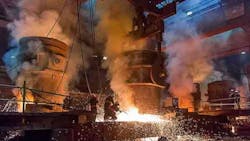Sheffield Forgemasters International Ltd. recently started the process of pouring a series of huge castings to fulfill a contract for mill and press builder SMS Meer. The steel foundry and forging operation in Sheffield, England, poured 600 metric tons of steel in a continuous process into a below-ground mold, for the first of what reportedly will be 11 castings.
The two-year contract is valued at $19 million for Sheffield Forgemasters.
“This is not the first time we have produced castings of this size, but the process is highly complex with precise timescales for each element of the pour – from melting the steel, transporting such large volumes of molten steel across the site and scheduling the continuous pour,” said Dr. Steve Price, managing director of sales.
SMS Meer designs and builds rolling mills, forging machinery, and similar engineered systems. SFIL has worked with the Düsseldorf-based group in the past, including producing the world’s largest single casting, a 325-metric ton component produced in 2010 for a closed-die forging press.
Casting large-dimension products and oversized ingots are a special capability for SFIL, which also has engineering capabilities for designing parts used in energy (nuclear, offshore, wind) projects and manufacturing systems (mill rolls, housings, etc.)
The foundry pours up to 10,000-metric tons/year foundry of carbon or stainless steel for products with maximum dimensions of 16×7.6×4.6 meters. It is able to produce castings weighing up to 350 metric tons, and engineering, patternmaking, ultrasonic testing, and heat-treatment of finished products are done on site.
SFIL’s forged parts weigh up to 275 metric tons.
SFIL’s past projects have included the largest cast nodes ever produced for offshore use, produced in 2013 for a North Sea platform.
About the Author
Robert Brooks
Content Director
Robert Brooks has been a business-to-business reporter, writer, editor, and columnist for more than 20 years, specializing in the primary metal and basic manufacturing industries. His work has covered a wide range of topics, including process technology, resource development, material selection, product design, workforce development, and industrial market strategies, among others.
